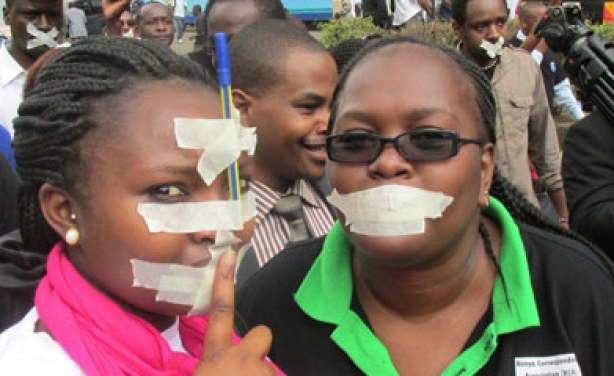Is Freedom of Speech Under Threat from Tanzania's Magufuli?
President John Magafuli has enforced laws and regulations to govern both digital and traditional media spaces in the country since he took office in 2015. Under his leadership, a number of opposition members have been arrested or jailed, and some people have been detained for "insulting" him. Bloggers, as well as Tanzanians operating online radio and television streaming services, are also required to apply for a license and pay an annual fee of over U.S.$900 before they can publish any material online. Online forums and social media users are also affected.

Tanzania's new law regulating online-related content is continuing to generate protest. Critics say President Magufuli is deliberately targeting freedom of expression.
The regulation known as the Electronic and Postal Communications (Online Content) Regulations 2017, initially published by the Tanzania Communications Regulatory Authority (TCRA), was signed in mid-March 2018. Before and after the signing many voices have been raised in protest.
Under the new regulations, bloggers, as well as Tanzanians operating online radio and television streaming services, are required to apply for a license and pay an annual fee of over $900 (€750) before they can publish any material online. Online forums and social media users are also affected.
Critics say that this is a staggering amount. They regard the fee as a further bid by President John Magufuli to gag dissident voices.
The new regulation gives the government the right to revoke a permit if a site publishes content that "causes annoyance" or "leads to public disorder." A blogger can also be fined up to $2,200 for publishing such content.
This week two musicians were briefly detained, one of them one of the country's most popular singers, Nassib Abdul, better known as Diamond Platnumz. He and 26-year old Faustina Charles, popularly known as Nandy, was arrested after they posted video clips deemed obscene by the authorities. Abdul had shared a video clip that showed him kissing a girl while Faustina Charles had posted a clip of herself with another musician that was considered indecent. Both were released on bail.
"We can say that the freedom of expression in this country is progressively being shut down, constricted and seriously limited," said Tanzanian political analyst Jenerali Ulimwengu. There is a lot of uncertainty in Tanzania at the moment about what the government may be planning to do next to further reduce press freedom and freedom of expression.
Media clampdown
Some media organizations have in the past been shut down for lengthy periods of time. In 2017 alone, at least four newspapers were suspended and shut down. The Swahili daily Tanzania Daima was suspended for 90 days after being accused of spreading "false information" in a story about anti-retroviral drug use for people with HIV. A local newspaper, Nipashe, decided to suspend weekend publication for three months after publishing material that apparently did not go down well with President Magufuli.
Some journalists have been arrested and others have been reported missing. The editor of a popular discussion platform, Jamii Forums, was detained and tried for publishing content related to corruption in Tanzania.
Reporters Without Borders (RSF) condemns the latest blow to free speech in Tanzania. "If Tanzanian authorities were aiming at killing online information, they would not go about it any differently," said Arnaud Froger, the head of RSF's Africa desk.
"At RSF, we are deeply concerned by the path Tanzania has taken since President Magufuli took office in 2015. Many radios have been shut down, investigative journalist Azori Gwanda is missing for 5 months and forum editors as well as journalists are regularly subject to criminal proceedings. So, this new regulation is a step further in a context of significant deterioration of press freedom in Tanzania," Froger said.
Alternative modes of expression
58-year-old President Magufuli took power in October 2015 and has slowly been tightening the laws that govern press freedom in the country, enabling police and government officials to increase their actions against media houses.
"I would like to tell media owners: Be careful, watch it If you think you have that kind of freedom, [it is] not to that extent," Magufuli said at a public event in March. This comment followed one made in January this year when the president said that the days of newspapers acting unethically were "numbered."
"If you allow traditional media to thrive, be it newspapers, radio or television stations, you allow people to speak out openly and to air their views. You can respond to those views, you can challenge their arguments with counter arguments, but you do not just shut down spaces and hope people will just shut up," said Ulimwengu.
The Tanzanian political analyst said people always seek alternative ways to express themselves, and these could be more damaging.
"The more the authorities clamp down on legitimate voices which seek to express themselves and air their grievances, this will necessarily lead more and more people into clandestine, underground and less transparent modes of expression," Ulimwengu told DW.
Less support for Magufuli
Magufuli, nicknamed 'the Bulldozer' for his strict leadership style, has dismissed dozens of senior public officials over allegations of corruption and inefficiency since he was elected in late 2015. First welcomed, his authoritarian style is attracting increasing criticism.
"Everybody was pretty much behind Magufuli when he took these measures," Ulimwengu said. "But I have a feeling that fewer people are inclined to support him because he has now tainted that anti-corruption, anti-tax evasion stance with the clamping down on freedom of expression. And people are asking themselves, if you're really doing something good for the people, why do you want to hide it?" he added.
Under Magufuli's rule, numerous opposition members have been arrested or jailed, and people have been detained for perceived "insults" to the president.



No comments: